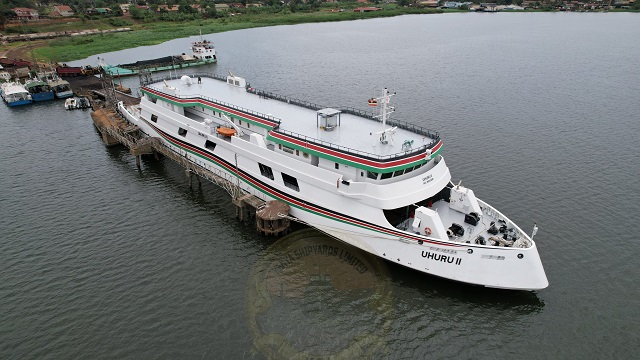
The 100-metre vessel has a capacity of more than 1,000 metric tons of cargo per sail, and is expected to sail three times per week across the three ports
Kisumu, Kenya | THE INDEPENDENT | The newly built Kenyan sea vessel, MV Uhuru II, on Friday, commenced its maiden trip from Kisumu Port to Uganda’s Port Bell on Lake Victoria in Kampala, majorly carrying steel cargo.
This followed the handover of the ship by Kenya Shipyard (run by the Kenyan army) to Kenya Railways Corporation the previous day.
It will be plying a triangular route between Kisumu, Port Bell, and Tanzania’s Mwanza Port, with prospects to greatly ease cargo movement between the three countries. The UGX 69 billion (Ksh 2.4 billion) vessel was completed and commissioned back in October 2023 and has since undergone compliance tests with international shipping safety and efficiency standards.
It is the fifth ship to launch operations on Lake Victoria in five years, with MV Uhuru I, which was launched in 2021 after rehabilitation, and Tanzania’s MV Mwanza-Hapa Kazi Tu which commenced operations to Port Bell from Mwanza last year.
The others are Uganda’s MV Mpungu commissioned in February this year by the Ministry of Works, scheduled to operate between the three ports, and the rehabilitated MV Kaawa cargo vessel. The launch of Uhuru II should now significantly enhance the potential of water transport on Africa’s largest lake, and also improve Uganda’s connectivity to markets in the absence of an efficient railway system.
“MV Uhuru II’s official entry into the service and our first operational journey on Lake Victoria today is indeed a monumental step in advancing Kenya’s maritime infrastructure and the blue economy,” Kenya’s Transport Minister (Cabinet Secretary) Davis Chirchir said.
The 100-metre vessel has a capacity of more than 1,000 metric tons of cargo per sail and is expected to sail three times per week across the three ports. Chirchir Urged for the removal of all non-tariff barriers across the East African Community, which he said were stifling trade and development.
“We are working to harmonise and standardize processes to reduce transaction time and the cost of doing business in our region,” Chirchir said. The petroleum products industry is expected to be the main beneficiary in this development, as they are the largest single import for Uganda.
*****
URN
 The Independent Uganda: You get the Truth we Pay the Price
The Independent Uganda: You get the Truth we Pay the Price





